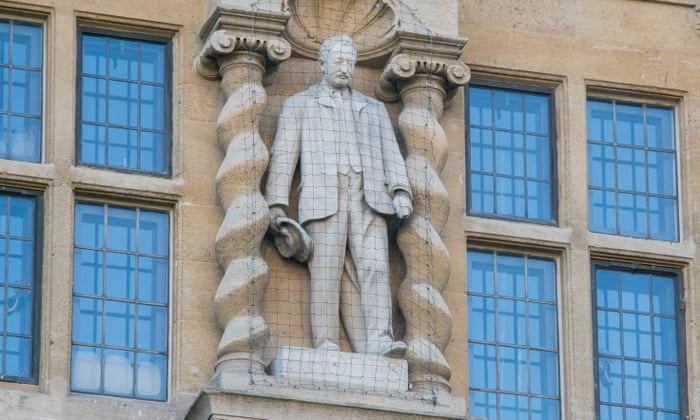Oxford decides against removing controversial statue of Cecil Rhodes
The controversial Cecil Rhodes statue at Oriel College was scheduled to be removed this summer due to its links to the slave trade. Oxford University’s Oriel College has however decided not to remove a statue of British imperialist Cecil Rhodes.
Students campaigned for the statue to be demolished, claiming that Rhodes, a businessman and politician in southern Africa in the nineteenth century, represented white supremacy and that his legacy should not be celebrated. The Rhodes Must Fall movement said the statue of the man who was an ardent imperialist and left a sizeable sum to the college in his will, was representative of Britain’s “imperial blind spot” and should be taken down. This campaign was supported by a group of councilors who called on Oxford University to “decolonize”. Twenty-six Oxford city councilors signed a letter saying the figure at Oriel College was “incompatible” with the city’s “commitment to anti-racism”.
In a statement released by Oriel college, they said that the college “abhors racism and discrimination in all its forms”. However, on Thursday the college, which owns the statue, said a consultation process had shown “overwhelming” support for keeping it.
A statement was issued which read: “The Governing Body has carefully considered the regulatory and financial challenges, including the expected time frame for removal, which could run into years with no certainty of outcome, together with the total cost of removal”.
“In light of the considerable obstacles to removal, Oriel’s Governing Body has decided not to begin the legal process for relocation of the memorials”.
“Following careful consideration, the college’s governing body has decided that the statute should remain in place and that the college will seek to provide a clear historical context to explain why it is there,” it said.
The college confirmed that it had been warned that removing the statue could result in a £100 million loss in gifts, but a spokesman insisted that the financial implications were not the primary consideration. He stated that the college believed the debate over whether or not the statute should remain should be conducted “in a spirit of free speech and open debate, with a willingness to listen to divergent views.”
According to a survey conducted by the independent university newspaper Cherwell, students strongly support the campaign group, but others have accused it of attempting to rewrite history. Chris Patten, the university’s chancellor, told students that if they couldn’t embrace free thought, they should “consider being educated elsewhere.”
The commission noted that an application for planning permission to remove the memorials would be extremely expensive, and also referred to the Government’s policy, concerning historic statues and sites which have become contested, is to ‘retain and explain’ them.
Therefore, the college stated they would turn their attention to the “contextualization of the college’s relationship with Cecil Rhodes” and by improving educational equality, diversity, and inclusion at the college.
“We understand this nuanced conclusion will be disappointing to some, but we are now focused on the delivery of practical actions aimed at improving outreach and the day-to-day experience of BME students. We are looking forward to working with Oxford City Council on a range of options for contextualization.“ – Lord Mendoza, Provost of Oriel College
The measures announced by the college are:
- Creation of the office of Tutor for Equality, Diversity, and Inclusion
- Fundraise for scholarships to support students from Southern Africa
- Have an annual lecture on a topic related to the Rhodes legacy, race, or colonialism
- Have an annual student prize on a topic related to Rhodes legacy, race, or colonialism
- Additional training for academic and non-academic staff in race awareness
- Further outreach initiatives targeted at BME student recruitment
The full statement from Oriel College can be found here.




